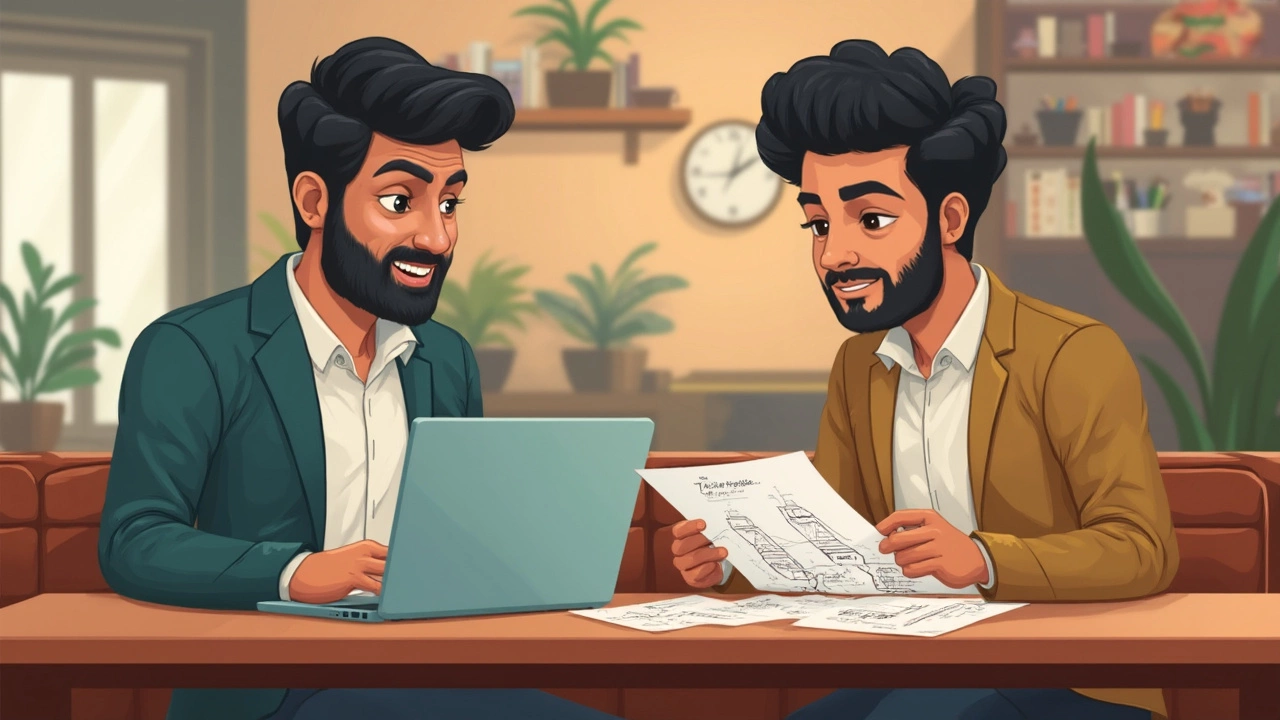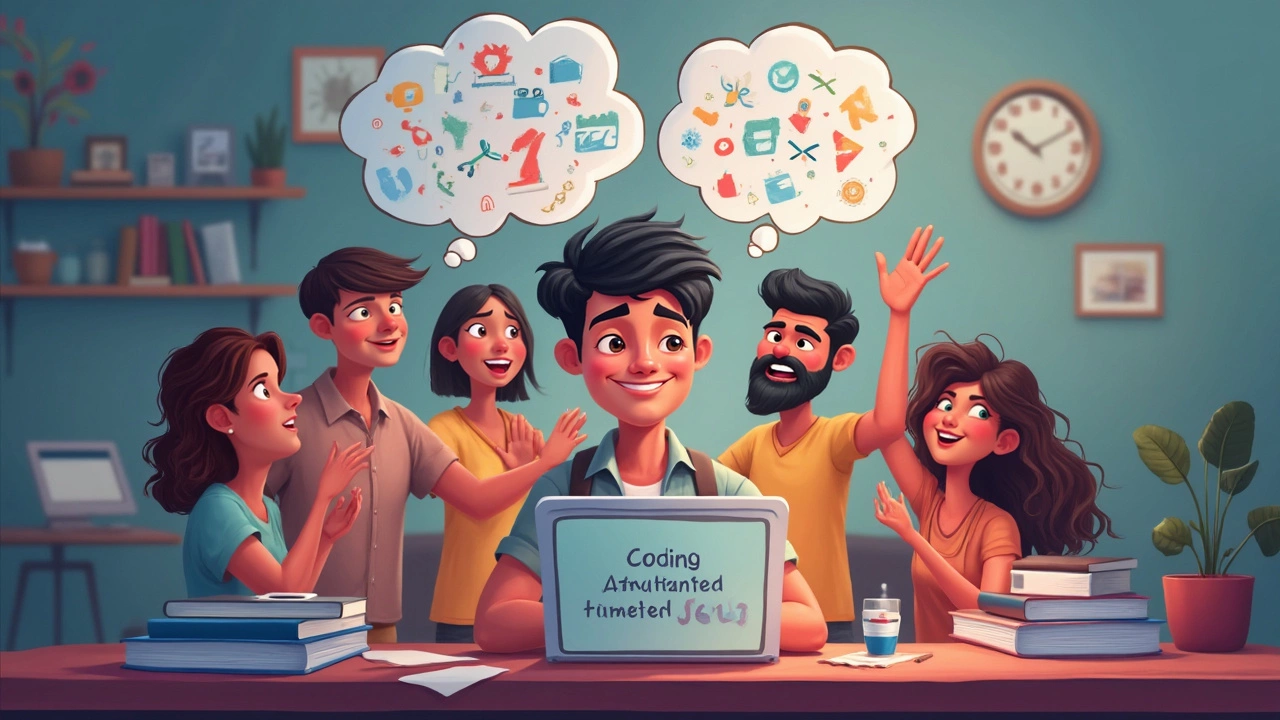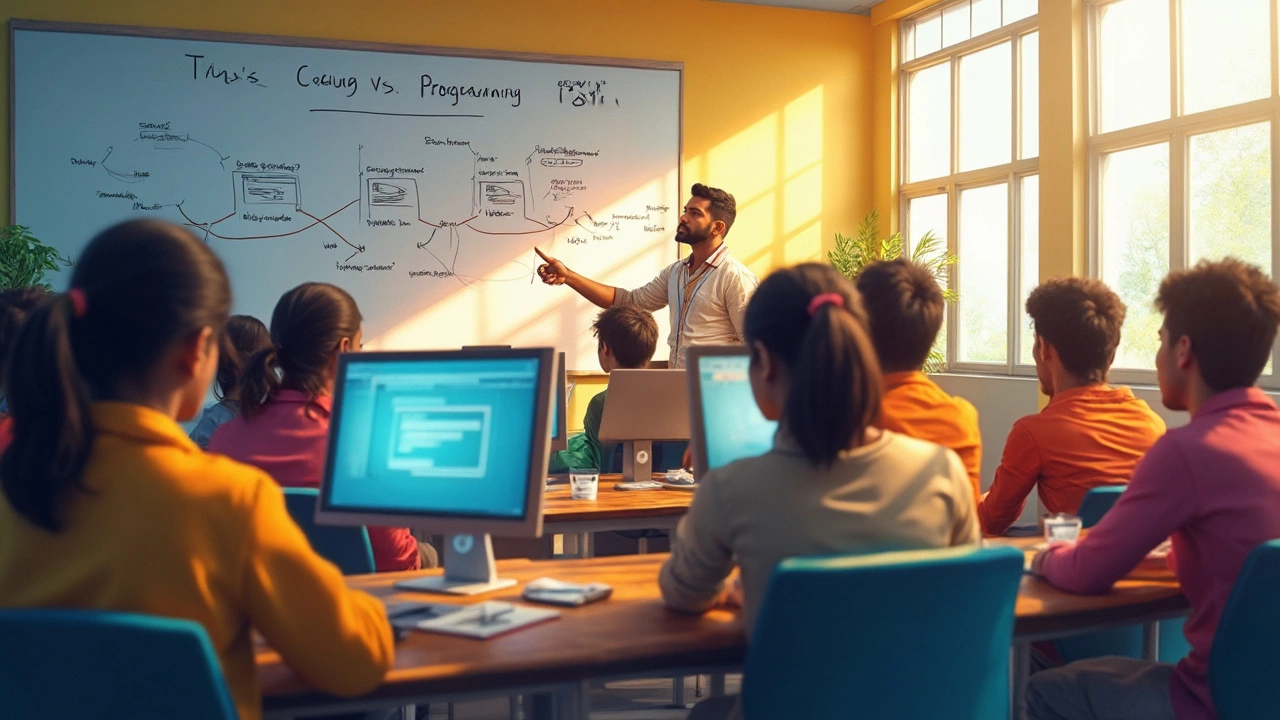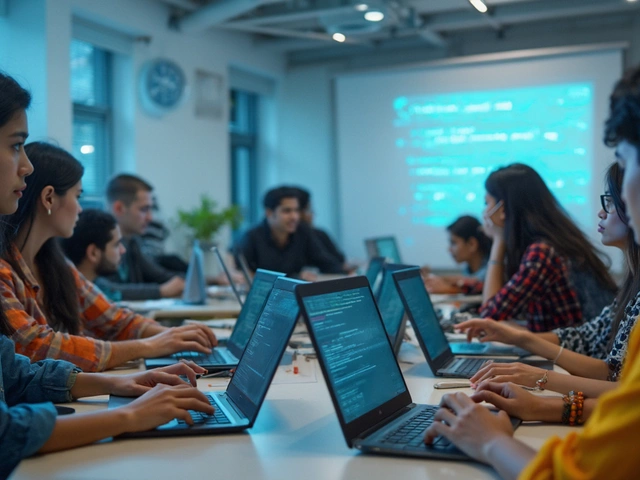Most people use 'coding' and 'programming' like they mean the same thing. They don’t. Each word points to a different step in the world of writing instructions for computers. If you’re thinking about taking a class or starting a tech career, knowing the difference can save you time and money.
Coding is basically writing lines of code—a set of specific instructions in a language a computer understands, like Python or JavaScript. Think of it as typing out the sentences in a recipe. You don’t have to know why the cake rises, you just follow what’s written.
Programming goes deeper. It’s about designing the whole recipe itself. Programmers have to decide what the final dish should look like, what ingredients to use, and how the steps fit together. They break big problems into small pieces and then make sure everything works smoothly.
- Defining Coding vs Programming
- Why Do People Mix Them Up?
- Real-World Examples
- How to Choose What to Learn First
- Tips for Leveling Up Fast
Defining Coding vs Programming
You’ve probably seen ‘coding’ and ‘programming’ used everywhere, and it sounds like they’re interchangeable. But ask anyone who’s spent real time building apps or websites, and they’ll tell you there’s a difference that actually matters, especially if you want to grow your skills beyond the basics.
Coding is about translating logic into a language the computer can understand. You’re using syntax and rules from languages like Python, Ruby, or Java to build the pieces. Coders take well-defined tasks — say, add two numbers or print a message — and write code that makes it happen. It’s the entry point for anyone interested in tech or building digital stuff from scratch.
Programming pulls back the camera. It’s the bigger picture: designing the solution, thinking about how the software functions, and dealing with the logic and structure under the hood. Programmers handle planning, splitting projects into manageable pieces, organizing code, and sometimes even testing every function. If coding is putting Lego bricks together, programming is imagining the whole Lego set, figuring out the structure, and making sure the finished model won’t fall apart.
- Coding focuses on writing clear instructions for the computer, sticking to specific syntax.
- Programming covers problem-solving, planning, debugging, and making sure everything works as a whole.
- Every programmer is a coder, but not every coder steps into programming territory right away.
The main takeaway: coding gets your hands dirty with code, while programming makes you think about how all the pieces come together to solve real problems.
Why Do People Mix Them Up?
If you’ve been browsing job boards or chatting with folks in tech, you’ll notice everyone tosses around the words coding and programming as if they’re twins. There’s a reason for that—sometimes, they overlap in day-to-day tasks, especially at companies where one person handles both writing scripts and planning how software should work.
A big reason for the confusion comes from tech courses and marketing. Many beginner courses talk about "learning to code" when they really mean you’ll be solving bigger problems, not just typing lines of code. Schools often label classes as 'coding' because it sounds less intimidating, but students end up doing programming exercises too.
Media plays a part as well. Articles and TV shows tend to show a single person typing away and call them a coder no matter what they’re actually doing. In reality, the difference comes down to the scale of work and the thinking behind it. Coding is about translating logic into language. Programming means building the logic and sometimes designing whole systems.
One interesting fact: even tech pros sometimes blur the line on their resumes to land more roles. The job market isn’t strict about these words, so titles get mixed up even if tasks differ. If you search for "coding" jobs, you’ll see listings that actually want programmers who can design and fix entire software systems, not just write simple scripts.
The bottom line? This mix-up happens because both skills are needed to make products work, and lines get blurry depending on who’s talking. Knowing the difference gives you a real edge when picking courses or applying for jobs.

Real-World Examples
It’s easy to get lost in all the technical talk, so let’s see how coding and programming look in real life. Imagine you're asked to build a simple calculator app for your phone:
If you're coding, you’ll take someone else’s plan and start writing the actual code. You write the part that adds, subtracts, takes user input, and shows the answer on the screen. You might use a language like Java or Swift. You’re focused on translating clear steps into a language the device understands.
Now, if you're programming, you’re deciding what features the calculator needs. Should it handle decimals? What happens if the user divides by zero? You sketch out the user interface, plan the flow, and maybe pick which coding language to use. Only after planning do you (or a coder) write the actual code.
Let's break this down even more with another example—building a website for a pizza shop:
- The coder sets up HTML for the menu and writes the script that calculates the price when you pick toppings.
- The programmer decides how customers will order, plans for online payments, and figures out how to track deliveries. They may also set up databases and security.
Big companies split these roles a lot. In a recent Stack Overflow Developer Survey, about 60% of professional developers said they spend more time on system design and solving problems (programming), compared to just writing lines of code (coding). Here’s a quick table showing the split in daily tasks for developers at tech companies:
| Task | Average % of Developer's Day |
|---|---|
| Planning/Design (Programming) | 30% |
| Writing Code (Coding) | 40% |
| Testing & Debugging | 20% |
| Team Communication | 10% |
If you’re just starting out, look for beginner projects that show you both sides: something simple where you follow instructions (to practice coding), and something open-ended where you solve a problem or design a solution (to practice programming). This helps you figure out what excites you the most, and which path to dive deeper into when taking coding classes.
How to Choose What to Learn First
Alright, if you’re staring at all these tech courses and thinking, “Do I start with coding or full-on programming?”—you’re not alone. Half the battle is picking your starting line. Here are some clear checkpoints to help you figure that out.
- If you want to build stuff (like websites or apps) pretty quickly, start with coding. Learning the basics of HTML, CSS, or even Python lets you actually see what you’ve made after just a few lessons.
- Programming asks you to handle bigger stuff—like making a complete app, understanding how users log in, or troubleshooting complex problems. It pays more (on average), but it takes longer to master.
- If instant results keep you motivated, go simple: code a calculator, a to-do list, or a personal blog. There are free platforms like Codecademy, freeCodeCamp, or Khan Academy where you can try this right now.
- If you want to build tech for a living and maybe one day lead a software team, start thinking programming: learn data structures, algorithms, and how software is designed.
The chart below will help you get a quick sense of what suits your personal goals and learning style:
| Goal | Start With | Recommended Language/Tool |
|---|---|---|
| Make a website fast | Coding | HTML, CSS, JavaScript |
| Automate simple tasks | Coding | Python, JavaScript |
| Build a mobile app | Programming | Java, Kotlin, Swift |
| Understand how programs work under the hood | Programming | Python, C++ |
| Land a tech job with long-term growth | Programming & Coding | Python, Java, JavaScript |
Don’t let the fear of ‘not being ready’ slow you down. You really don’t need a computer science degree to get started. Most beginners today start with coding, get some wins, and then move deeper into programming at their own pace. You can, too.

Tips for Leveling Up Fast
Want to get better at coding and programming without wasting months on stuff that doesn’t matter? Here’s what actually works—straightforward, no guesswork.
- Practice Every Day: Even 20 minutes makes a difference. You build muscle memory by typing and seeing real errors. Consistency beats cramming.
- Work on Personal Projects: Make something that solves a problem for you. You remember more when the project matters to you—build a simple website, a calculator app, or automate boring tasks on your computer.
- Read Other People’s Code: Platforms like GitHub let you see how skilled developers structure their work. This helps more than you think—study the comments and see what good code really looks like.
- Ask For Feedback: Don’t just code in a bubble. Join free forums like Stack Overflow or Reddit, upload your code, and pay attention to advice from more experienced folks.
- Know When to Google: You don’t have to memorize syntax. Even top-level programmers Google stuff daily. Learn how to find your answers quickly, instead of getting stuck.
If you like stats, check this out:
| Habit | Success Rate |
|---|---|
| Daily Practice (20+ min) | 75% report major skill growth in 3 months |
| Building Projects | 65% land jobs faster |
| Using Forums for Feedback | 80% feel more confident solving hard bugs |
If you’re just starting coding classes, focus first on one language—something beginner-friendly like Python. Once you’re comfortable, branch out. It’s normal to feel lost at times; the key is to keep making things, not just reading or watching videos. The more you build and break stuff, the faster you level up.



